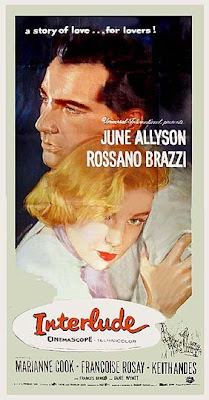Scott Towler is a terminator like Arnold Schwarzenegger. Though you can’t play him out as if his name was Sega.
Call it what you want, Interlude, Intermezzo, Entr’acte, but they all mean the same thing. Sort of. Looking back at history and trying to decide when music became a part of stage (and in later years screen) is a difficult thing to trace. For one, we don’t really honor history as much as we should with regard to the classics and the roots of performance art. Instead, we bastardize half lessons from our past into meaningless modern mediums, all of which are devoid of any true thought or homage to its derivation.
Unfortunately for us, that means that some of life’s most simple pleasures can get swept under the rug as we modernize the world. Plays get turned into movies, which get turned into TV shows, and now their latest incarnation, in the form of short viral webisodes and meaningless Youtube pablum. However, one medium hasn’t lost it’s flare: the interlude. If anything, it’s only gotten better with time. Kind of like peeps (you know, the things you get at Easter…at first they’re all squishy and gross, but then if you let them get really stale, they become these delicious hard candies. Plus you can explode them in a microwave…at least, that’s what the devil on my left shoulder said, and I trust that guy).
The interlude was never about the musician. It was simply a musical backdrop to bridge time between acts (in a play) or scenes (in a film). Many modern artists employ interludes on their albums as well, paying tribute to this. Andrew Bird, for example, has some of the most masterful interludes on his past 2 records of any artist that I’ve heard. Same with the UK’s The Divine Comedy. His last 2 albums have included a peppering of amazing interludinal work as well. And it’s clear when listening to these records that these interludes function just as they did thousands of years before in ancient Greece or Rome: breaking up the action (in this case, of the album), and keeping the audience salivating for more.
Met Her Up in Cafe Intermezzo For Some Late Night Pastry.
But how does it translate today? Clearly Andrew Bird isn’t going to produce an album of instrumentals. In fact, artists who delineate from their original course as musicians tend to flop when they take such chances. Look at the Beastie Boys most recent effort, The Mix Up. Sure, the record had merit, but it felt put on, as if they were just making something out of nothing, filling gaps in time instead of gaps in sound and action. It didn’t work for me. In Sound from the Way Out, now that’s a different story. But that’s like comparing apples to Mexicans…they’re too different to make any correlation between, yet are still inexplicably linked. Same with dollars and donuts. Go figure.
But with my love of montage in film (and no, not the closing scene from Crash), a series of scenes cut together against a musical backdrop (aka the interlude), I’ve always been searching for artists that create music specifically designed for those moments. They are few and far between, but one such label seems to be pioneering the genre. ESL records, or Eighteenth Street Lounge records is based out of Washington D.C. as was formed by the two members of Thievery Corporation, a group that has seen a tremendous upswing in popularity since Zach Braff’s employment of their song “Lebanese Blonde” in his movie Garden State. But that song (and scene aside), they offer a variety of artists that lend themselves to montage perfectly.
Many critics agree that much of Thievery Corporation’s catalogue of music blends together into one sound. Though I’m not sure if I agree with that entirely, I can see what they mean. Listening to The Mirror Conspiracy or The Richest Man in Babylon, I can hear the semblance. Many of their artists follow form in their own right, producing record after record of like minded music. Blue States, for example, and Federico Aubele (shown below), have produced two very similar sounding albums. Additionally, ESL has released a series of mixes, ranging from Thievery Corporation’s The Outernational Sound to the label’s own Jet Society and Modular Systems, that while mixing artists, tend to follow an overarching theme.
ESL: No Longer Merely For the Linguistically Deficient
And while it’s easy to call this modern lounge music, passively ingesting each track as if it were meant for the background, there’s a lot more to it. This label has taken the concept of the interlude, and stretched it into an entire realm of thinking. They’ve seamlessly blended instrumentation with digital effects and samples, while at the same time preserving a sound that doesn’t try to overtly catch your attention. And while that may not seem like much, often times in life the things that appear the most simple, or unnoticed, are often times the hardest to acheive. Think back to one of your favorite montages, or transitions in a film, and you’ll understand exactly what I mean. If nothing else, revel in the fact that an entire label – an entire collection of 100 plus unique releases – has dedicated itself to something that went virtually unnoticed until you paid it mind. It’s not quite Tennessee Williams’ blue piano, but it accomplishes the same thing.
Download:
MP3: Andrew Bird-“The Supine”
MP3: Thievery Corporation-“Outernationalist”



